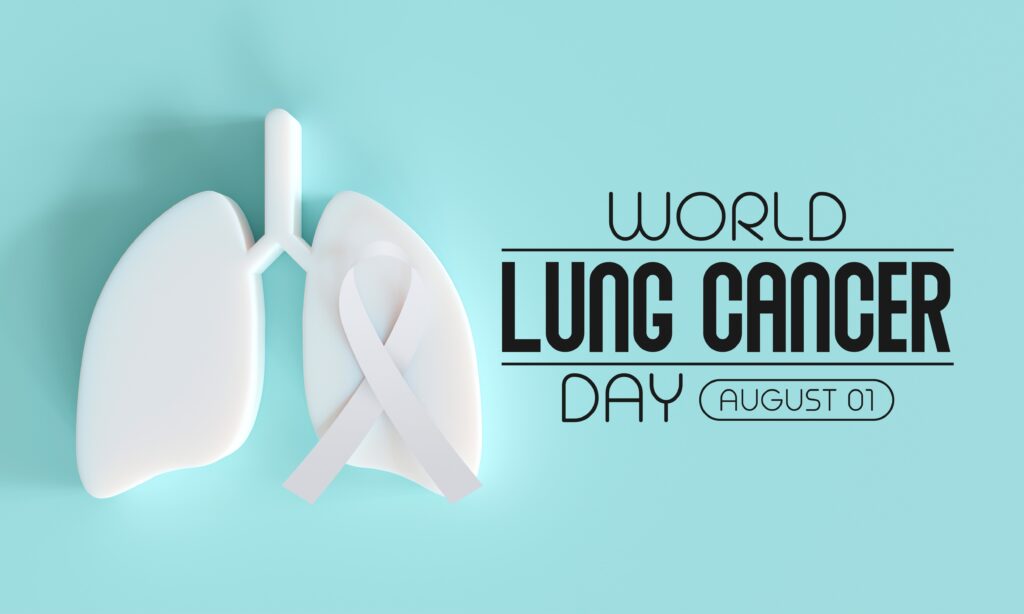World Lung Cancer Day, observed annually on August 1, serves as a global platform to raise awareness about lung cancer, honor those affected and highlight advancements in research and treatment. The theme of World Lung Cancer Day 2024, “Stronger Together: United for Lung Cancer Awareness,” emphasizes the critical role of unity in the fight against lung cancer.
This blog will discuss new US Food and Drug Administration(FDA)-approved treatments, promising clinical trials and the latest advancements in lung cancer research, providing hope for better patient outcomes.
Lung cancer is the second most common cancer worldwide and the leading cause of cancer death, responsible for about one in five cancer deaths globally. In 2024, an estimated 238,340 new cases of lung cancer and 127,070 deaths from the disease will occur in the US alone.
What Is Lung Cancer?
Lung cancer begins in the lungs and can spread to lymph nodes or other organs in the body. There are two main types: non-small cell lung cancer (NSCLC) and small cell lung cancer (SCLC).
NSCLC is more common, grows more slowly and accounts for about 85 percent of cases. SCLC, though less common, is more aggressive, grows and spreads rapidly. It is found in the central parts of the lungs and is divided into two stages: the limited stage, where the cancer is confined to one side of the chest and can be treated with radiation; and the extensive stage, where the cancer has spread beyond one side of the chest, often requiring chemotherapy.
Newly Approved Treatments for Lung Cancer
Lung cancer treatments have evolved significantly, driven by advancements in targeted therapies and immunotherapies. New FDA-approved therapies have been found to be more effective and have fewer side effects than traditional chemotherapy.
Tepotinib: A MET Inhibitor
Tepotinib is approved for metastatic NSCLC with MET exon 14 skipping alterations. This MET inhibitor targets the abnormal MET protein, helping to shrink tumors. A case report showed tepotinib’s effectiveness in Chinese patients, with one patient achieving a partial response and others showing stable disease. It was well-tolerated, with only mild side effects.
Tarlatamab: A DLL3-Targeted BiTE
The FDA granted accelerated approval to tarlatamab for the treatment of patients with extensive-stage SCLC who have progressed after platinum-based chemotherapy. Tarlatamab is a delta-like ligand 3 (DLL3)-targeted bispecific T-cell engager (BiTE) that directs the immune system to attack DLL3-expressing cancer cells. This approval provided a much-needed option for patients with this aggressive form of lung cancer.
Rybrevant (amivantamab-vmjw): An EGFR and MET Inhibitor
Rybrevant was approved in combination with chemotherapy and is now used as the first-line treatment for patients with NSCLC with a rare epidermal growth factor receptor (EGFR) exon 20 insertion mutation. The approval was based on a study showing that Rybrevant with chemotherapy significantly slowed disease progression and reduced the risk of death by 61 percent compared to chemotherapy alone.
Related: Imdelltra Approved as First T-Cell Engager Therapy for Extensive-Stage Small Cell Lung Cancer
Promising Upcoming Treatments in Clinical Trials
While recent FDA approvals are encouraging, ongoing clinical trials continue to explore novel therapies. Here are some promising treatments currently in Phase II/III trials.
NVL-330: A HER2-Selective Tyrosine Kinase Inhibitor
NVL-330, developed by Nuvalent, Inc., is in Phase Ia/Ib clinical trials for pre-treated patients with human epidermal growth factor receptor 2 (HER2)-altered NSCLC. NVL-330 is designed to penetrate the brain to address metastases. It targets HER2 exon 20 mutations while being selective for HER2 over wild-type EGFR, minimizing gastrointestinal and skin toxicities.
Bemcentinib: An AXL Kinase Inhibitor
Bemcentinib, from BerGenBio ASA, is in Phase Ib/IIa trials for NSCLC with STK11 mutations. It is combined with Keytruda (pembrolizumab) and chemotherapy. Recent data showed acceptable safety, allowing the trial to proceed to the second dose level in Phase IIa, focusing on dose response.
Lorlatinib: An ALK Tyrosine Kinase Inhibitor
Lorlatinib (Lorbrena), developed by Pfizer, showed promising results in the Phase III CROWN study, with a majority of patients with anaplastic lymphoma kinase (ALK)-positive advanced NSCLC remaining progression-free after three years. Lorlatinib targets and inhibits the abnormal ALK protein that drives cancer cell growth. Real-world data shows how lorlatinib effectively controls the disease and extends survival, providing new hope for patients dealing with advanced stages of lung cancer.
Several other clinical trials are also studying investigational candidates for NSCLC and SCLC.
One Phase II trial compares two immunotherapy regimens, atezolizumab alone or with tiragolumab, alongside chemoradiotherapy for patients with advanced stage 3 NSCLC. Another investigates the safety and effectiveness of EIK1001 combined with Keytruda and chemotherapy in patients with advanced stage 4 NSCLC who haven’t had prior systemic therapy. Bio-Thera Solutions has begun Phase I/III trials for BAT3306, a biosimilar of Keytruda.
For SCLC, Amgen is recruiting for a Phase III study to compare the effectiveness of tarlatamab to standard treatments in extending overall survival in patients with relapsed SCLC after initial platinum-based chemotherapy. The Mayo Clinic is sponsoring a Phase II trial to test durvalumab and lurbinectedin for treating patients with extensive stage small cell lung cancer (ES-SCLC) that has relapsed or not responded to previous treatments.
XTALKS WEBINAR: Digital Health Tools That Will Transform Cancer Treatment
Live and On-Demand: Thursday, August 22, 2024, at 1pm EDT (10am PDT)
Register for this free webinar to learn how pharmaceutical and life science technology companies are collaborating to harness digital health tools in oncology care delivery.
Lung Cancer Market Data
The global cancer therapeutics market was valued at $136.6 billion in 2022 and is projected to reach $299.13 billion by 2031, growing at a compound annual growth rate (CAGR) of 9.1 percent. The lung cancer therapeutics market is expected to grow from $21.8 billion in 2021 to $54.7 billion by 2028, driven by rising cases of NSCLC and SCLC.
The rising incidence of lung cancer, driven by factors such as high air pollution and tobacco use, makes it a dominant segment in the cancer therapeutics market. NSCLC is a particular focus due to its prevalence and the need for effective treatments. Additionally, the global oncology liquid biopsy market is projected to reach $10.1 billion by 2029, aiding in therapy selection and disease monitoring for lung cancer patients.
World Lung Cancer Day 2024: The Road Ahead
Cancer research isn’t without its challenges. Tumors often develop resistance to targeted therapies, finding new ways to grow, which calls for combination treatments and next-generation inhibitors. The diversity of lung cancer makes finding effective treatments for each patient tricky.
World Lung Cancer Day 2024 is a reminder of the strides made in lung cancer treatment and the importance of continued innovation. With new FDA-approved therapies and a robust pipeline of investigational treatments, there is hope for improved survival and quality of life for lung cancer patients.
Additionally, the Lung Cancer Research Foundation (LCRF), in collaboration with 23andMe and 20 lung cancer advocacy organizations, launched the Lung Cancer Genetics Study very recently. Participants will be able to provide genetic data through 23andMe kits and share their experiences via surveys. This information will help researchers develop better ways to detect, treat and prevent lung cancer. The data will be available to scientists worldwide, providing researchers with critical genetic information and patient experiences.
This World Lung Cancer Day 2024, wear white to show your support. Explore social media campaigns with personal stories and facts about lung cancer and virtual educational sessions featuring experts. Empower yourself with the latest advancements in treatment and research and join community events aimed at promoting early detection and prevention strategies.











Join or login to leave a comment
JOIN LOGIN